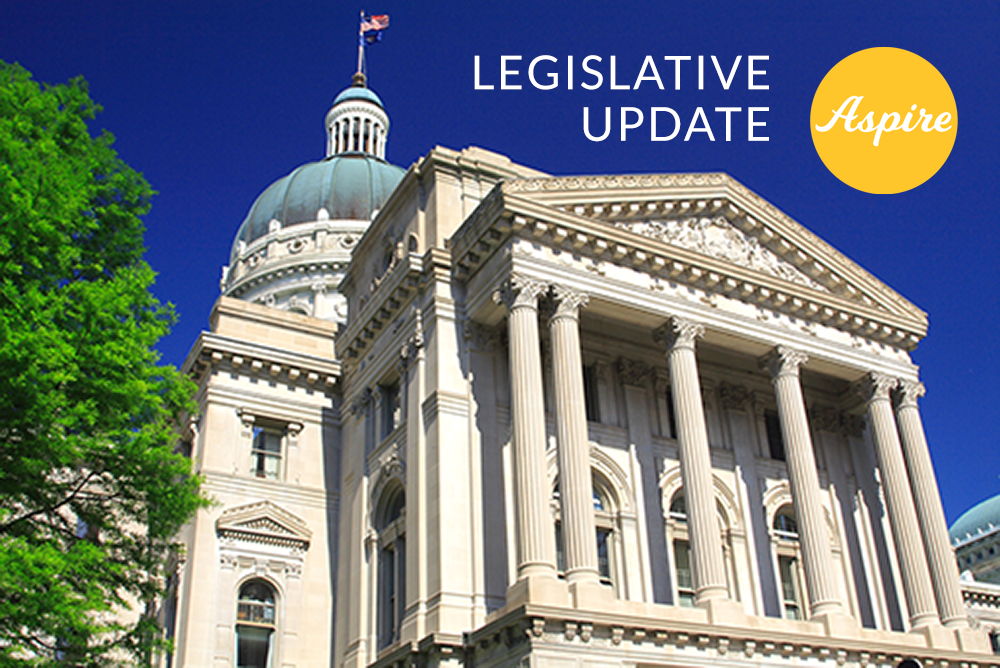Legislative Update Final Week: : Bills that Crossed the Finish Line

We have finished the end of the 2020 legislative session! Just like it began, it ended with a bang instead of a whimper. This short session which everyone, including leadership, said would be a quiet session, it could only be described as “frenetic.” It began with major policy initiatives introduced and moved at the speed of light. It ended with surprise amendments the public first heard about in the last waning days of the session. And add to this a late session start date and an early finish date – the 2020 session is one for the record books. Some interesting number facts:
House Bills Introduced: 452
House Bills that moved to the Senate: 114 (25%)
House Bills eligible to become law: 89 (20% of introduced House Bills)
Senate Bills Introduced: 451
Senate Bills that moved to the House: 169 (37%)
Senate Bills eligible to become law: 79 (17% of introduced Senate Bills)
Blended percentage of all introduced bills headed to the Governor: 19%
Here are session highlights, beginning with an update on House leadership and Aspire’s 2020 session top priorities.
New Speaker of the House
Speaker of the House Brian Bosma announced on Organization Day in late 2019 that he would not only retire from his House seat after 34 years in office but would also step down as Speaker before the end of the session. On Monday, March 9, he stepped down and the new Speaker of the House, Rep. Todd Huston (R-Fishers) was officially sworn in. Speaker Huston has served in the Indiana General Assembly since 2012. Congratulations, Speaker Huston!
Smoking Age Raised to 21
For years, the health and business communities, including Aspire, have asked the Indiana General Assembly to raise the age of smoking tobacco products from 18 to 21. This year, the legislature finally made progress. SB 1, authored by Sen. Ed Charbonneau (R-Valparaiso) increases the age of buying or possessing tobacco, e-liquids, or electronic cigarettes from 18 to 21. While the federal government recently made this change first, essentially forcing states to comply, this legislation also includes enforcement mechanisms including doubling fines for retailers that sell products to those under the age of 21. These bills received significant support from members (minus a few votes by more Libertarian-minded legislators) and as a priority for the governor, we expect him to sign it soon.
The health and business communities, including Aspire, have also been calling for a tobacco tax increase in Indiana. Will increasing the tax on cigarettes and similar products happen in 2021? It is an easier path to achieve because 2021 will be a budget year and NOT an election year – but only time will tell.
Central Indiana will Lead the Way on a New Structure for Regional Planning
Aspire worked to support and keep alive SB 350 - Regional Development by Sen. Travis Holdman (R-Markle). This bill originally created a statewide blueprint for regional “investment hubs,” including the ability to raise and spend revenue across political boundaries within the region. The Senate removed the funding mechanisms, narrowed the bill to a pilot program for the Indy Region, and connected our existing Metropolitan Planning Organization (MPO) and Regional Development Authority (RDA).
This bill is a great step forward for regionalism. Our new regional structure for organizing across county and city borders will help us tackle infrastructure and basic services, along with long-range economic development and infrastructure priorities. It is on its way to the governor to sign.
Next, counties and municipalities interested in participating will adopt similar resolutions to create and adopt a preliminary strategic economic development plan. This pilot program expires on July 1, 2025.
Workforce Development
HB 1419 Governor’s Workforce Cabinet went to the conference committee, but there were only minor tweaks made to the bill. The conference committee report passed the Senate by a vote of 39-10 and the House 91-3. Also, HB 1153 authored by Rep. Chuck Goodrich (R-Noblesville) which requires the Governor’s Workforce Cabinet to create a comprehensive strategic plan to align the state’s primary, secondary, and postsecondary educational systems to workforce training programs and employer passed the Senate 41-8 and the House 93-1.
IndyGo Transit Funding Protected, for Now
As we have been reporting, a surprise amendment was added to legislation that would significantly affect transit in Central Indiana. As for a bit of background, in 2014 the Indiana General Assembly passed a law requiring IndyGo operations to match its new tax revenue with a 10 percent match in private dollars to help finance new mass transit operations, including the Red Line which debuted in 2019. But this law had no enforcement mechanism. Sen. Freeman (R-Indianapolis) added the last-minute amendment (six) to legislation on northwest Indiana transit by Rep. Ed Soliday. The amendment would have required the state to withhold 10 percent of IndyGo’s local income tax revenue in years that they did not meet the private funding threshold.
Aspire opposed this amendment because the language would have redirected local Marion County tax revenue from its rightful purpose and delayed the development of a robust regional transit system in Central Indiana. If adopted, it would have jeopardized plans to implement the planned Blue and Purple rapid bus routes. It also risked implementation of new local route frequency and hours, intended to further improve convenience and access, and better align local routes with the established Red Line.
The Senate passed compromise language that would phase-in the private match over three years before it adjourned. But in the waning hours of the session, bill author Rep. Soliday and newly elect Speaker Huston pulled HB 1279 from consideration, not allowing a vote and making it dead for the session. So, transit dollars are safe – for now.
ILEARN/School/Teacher Accountability
In response to the #RedforEd rallies and significant pushback from the educational community, the Indiana General Assembly responded by making sweeping changes to accountability to testing this year. SB 2, introduced by Sen. Jeff Raatz (R-Richmond) and HB 1002, introduced by Rep. Tony Cook (R-Cicero) allowed for a two-year hold harmless provision for teachers and schools from the ILEARN exam and the removal of the requirement for student achievement measures to be used in teacher evaluations, respectively. These bills received near-unanimous support throughout the session and are anticipated to be signed by the governor.
Distracted Driving Now Becoming Law
A surprise policy priority on Gov. Eric Holcomb’s policy list at the start of the session that was not included in the House or Senate priorities was passing a law on distracted driving. HB 1070, authored by Rep. Holli Sullivan (R-Evansville), states that a person may not hold or use a telecommunications device while operating a moving motor vehicle. The point penalties on a driver’s license will not begin until July 1, 2021. Studies have shown that distracted driving is the leading cause of traffic accidents and fatalities. This bill was sent to the Governor to sign.
Coal Legislation Watered Down but Passed
HB 1414 was introduced to slow down and/or cease the closure of coal-fired power plants in Indiana. This topic was already argued in 2019 and sent to a two-year study, the 21st Century Energy Task Force. However, it came back in 2020 at the behest of Indiana’s largest coal producers and championed in the Statehouse by House Utilities Chairman Ed Soliday (R-Valparaiso). As introduced, the legislation would require approval from the Indiana Utility Regulatory Commission before closing a coal plant, allow utilities to stockpile up to 90 days of coal (therefore likely increasing rates for consumers), and require utilities to dispatch existing and closed coal plants to be ready for service at any time. The bill was significantly watered down in the Senate, but some of the House versions made it back in during the conference committee. This was one of the closest votes in both the House and Senate this session with the bill passing with an extremely narrow margin but now heads to the Governor for his signature.
Landlord/Tenant Issue Passes
Also, a surprise move in the last weeks of the session, the language was introduced in a bill that would supersede local ordinance language regarding landlord-tenant issues – a move specifically to undo what the Indianapolis City-County Council passed just days before. A fight to the finish, the language had to be removed from one bill (due to germaneness issues) and placed in another, SB 148. After, another tight vote to get the conference committee through the House and Senate, the bill is headed to the Governor for signature.
Legislation That Didn’t Make It – Teacher Pay, Pregnancy Accommodations, Site of Service, Attorney General, and Transit
For as many bills that DID pass, there were still some major policy initiatives that did not make the finish line:
• Despite calls for an increase of teacher pay, no legislation moved to address this initiative – mostly because it was not a budget year.
• The governor called to increase accommodations for pregnant workers. Pushback from the Indiana Chamber and Indiana Manufacturer’s Association about limited recourse for employers resulted in the Senate recommending the legislation for a summer study committee but it dyed in the House. This issue will likely resurface in future sessions and is also getting addressed at the federal level.
• Similarly, the language was removed as one of the health care omnibus bills that sought to reduce reimbursement to hospitals for satellite center services, otherwise known as the site of service. Originally added to address the argument that overhead cost structure was much less than at a traditional hospital setting, hospital CEOs and administrators, led by the Indiana Hospital Association, explained that lower reimbursements would force hospitals to discontinue services and reduce staff – especially in rural areas. The language was removed unanimously by a voice vote.
• In a surprise move, Representative Tim Wesco (R-Elkhart), offered an amendment to a bill that would prevent anyone having been disbarred or had their law license suspended for 30 or more days to run for the office of Attorney General. This came in response to AG Curtis Hill’s recent disciplinary hearing recommendation that his law license be suspended for at least 60 days without automatic reinstatement after allegations that he groped four women in 2018. After calling for his resignation in 2018, Gov. Holcomb endorsed the legislative proposal this week. The Senate negotiated language that would allow AG Hill to stay in office for the remainder of his term but would prevent him from running for another term. The House and Senate debated behind closed doors and could not come to a final agreement.
Upcoming Committees
Committees are complete for the 2020 legislative session.
Important Upcoming Dates
May 13, 2020 – Technical Corrections Day
